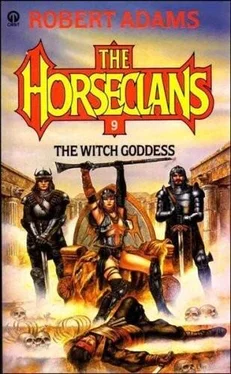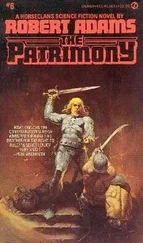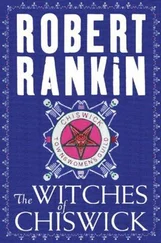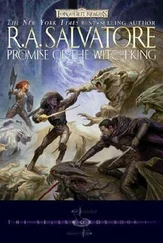Corbett halted atop a hill and reined about to ride back and see if he and his men could help with the screaming, rearing, kicking pack beasts. But before he could make another move or speak a single word, the rocky ground beneath his mule’s hooves seemed to shift. Shrieking and thrashing, the mule staggered and fell, Corbett managing to clear leather barely in time to avoid going down with the animal.
Braun was not so quick or fortunate. His big, powerful mule fell with a thump on the heaving ground, pinning his left leg, movements of mule and ground serving to further mangle the crushed limb. He screamed once, then, mercifully, lost consciousness.
Erica’s mule, though it kept its feet, proceeded to buck her off to land, winded, stunned and gasping, in a thick clump of thorny brush. Freed of its rider, the once-docile saddle mule went savagely berserk, attacking ponies and men indiscriminately, before Sergeant Gumpner drew his sidearm and shot the murderous beast.
The near pandemonium which had earlier engulfed the pack animals was now complete, total, affecting not just the ponies and mules but many of the men as well. And Major Jay Corbett could not bring himself to blame those men anymore than he could fault the frantic animals, for few were as stolid and stoic as Master Sergeant Gumpner and fewer still had the benefit of his own centuries of self-discipline.
Not only was the ground heaving and tossing like storm-roiled sea-waves, with trees crashing down or splitting asunder, but animals—wild beasts of all descriptions—still were terrifiedly crossing the track along the base of the cliffs, a brown-black airborne river of squeaking bats was issuing from at least two cave mouths somewhere on those cliff faces, and rocks and boulders were being torn loose to plunge down among the frightened agglomeration of men and animals.
The sight of the falling rocks awoke a horrifying presentiment in Corbett’s mind. As icy chills raced up and down his spine, setting his nape hairs to rising, prickling, he staggered over to the still-downed mule, disregarding the danger of its thrashing long enough to secure his transceiver from its place.
” Vance ! Sergeant Major Vance! This is Major Corbett, Sergeant Major, over!” Twice and part of a third time he had to repeat his transmission before the voice of the noncom acknowledged.
The subordinate sounded a little breathless, panting, but relatively calm. “Sergeant… Sergeant Major Vance here, sir. Over.”
“Vance, don’t interrupt, just hear what I say and do it, immediately! You and the rearguard get away from those cliffs. Ride if you can, run if you can’t, but pass the word to get any men and especially pack animals that are still on that track off it, west of the line of small hills, as quickly as possible. Do it Vance ! Out!”
Then Corbett turned back to those immediately surrounding him. Braun’s mule just then regained its feet, trembling like a leaf, its eyes rolling whitely, and Corbett quickly stepped over, grasped the dangling reins and secured them to a nearby bush, lest the animal take it into its head to bolt. A brief glance at Dr. Braun told Corbett’s experienced eye that he was probably hurt, possibly badly hurt, but still alive and breathing, though unconscious.
In the hollow ahead, Gumpner and a handful of his men were trying to either raise downed ponies or to quiet the few still on their feet and within reach.
As the movements of the earth began to slack off a bit, Corbett went back to his own mount, stroked it while speaking soothing, meaningless words and, when it had calmed down a bit, superficially examined it for broken bones or injuries, then slowly, carefully guided it back onto its feet.
With his arm through the reins, the officer continued to verbally soothe the big beast, while examining the saddle and the various items of equipment. The canteen was an utter loss, crushed by the mule’s weight and holed by a sharp rock, but all the other pieces seemed to be intact and still usable, if somewhat scuffed. The rifle scabbard was scraped, with a buckle almost torn off, the stock was scored in places, but the action still operated smoothly and the sights showed no damage or misalignment.
Aware that mules and all herd animals tended to be calmer in proximity to others of their kind, Corbett led his mule over to where he had hitched Braun’s mount. It was just then that Erica came slowly limping out of the brush, her face and hands thorn-scored and dripping blood, her black hair in wild disarray and filled with leaves and twigs.
“Where’s that bastard of a mule I was riding, Jay? Have you seen the fucker?”
He handed her the reins of Braun’s mount. “Take this one, Doctor—Braun won’t be using one soon, I’m afraid. Yours is dead. After it threw you, it went bonkers and Gumpner had to shoot it.”
“If he hadn’t shot the misbegotten son of a bitch, I would’ve,” Erica said grimly. “I couldn’ve easily been killed, blinded by those goddamn thorns.”
Corbett shook his head reprovingly. “Doctor, you can’t fault dumb beasts for fearing earth tremors. Or men, either, for that matter.”
“But, damn it, Jay, I…” And the earth heaved again, ferociously, tripping her still-wobbly legs from under her.
Both of the mules brayed their terror and reared, their big, steel-shod forehooves flailing. Corbett let drop the scabbarded rifle he had just removed from his own mount and, placing himself between the terror-stricken animals, took a tenacious grip on their headstalls and rode up and down with their rearings, using his weight to bring them down more quickly and his voice to calm them.
Because of his preoccupation with the mounts and the fact that he and they were facing south, he did not see the calamity that in the mere blinking of an eye befell the bulk of the precious pack train and the men accompanying it. But he heard it. He heard and felt it, and he knew . Even before he turned to see, he knew .
Sergeant Major Vance, obediently following Corbett’s order, had himself ordered most of the rearguard off the track and well out from the cliffs. Then he and a few picked men, on half-maddened and barely controllable ponies, had galloped south along the track, trying desperately to see the other order carried out—getting the pack train off the track, away from the beetling line of cliffs and over the line of low hillocks to the west.
But, due principally to the hysterical state of most of the riding and pack beasts, it was a nearly impossible task, and precious few men and animals were beyond the point of danger when the second massive series of shudders shook the rocky earth and, with a grinding-crashing roar, the entire line of cliffs buckled and tumbled down, burying men, beasts and loads beneath uncountable tons of shattered rock.
“Oh, sweet Jesus,” Corbett said softly, sadly, looking at the rocky mass grave the line of cliffs had so suddenly become. Where the two scientists—Arenstein and Braun—might and soon would .bewail the loss of the devices, books and metals, the officer could think just now only of his men, his dead men.
He had known those men most of their lives, had trained and worked with them from their mid-teens, just as he had with their fathers, before them. He had ridden and marched and, occasionally, fought beside them; he had shared camp and fire and cookpot and hooch with them, heat and cold, danger and privation. He had long ago earned their warm love and their deep respect, both of which he had returned. And now they were dead, most of them, and he knew that he never again would even see their bodies.
And a part of him harbored a deep hunger to be there with his command, to lie dead beside them under those chunks of rock, to be finally, fully dead at last, as he should have been centuries ago. Major James Hiram Corbett, USA, had been a deeply religious man; indeed, only paternal pressure and his appointment to the USMA at West Point had kept him out of a seminary and the ministry.
Читать дальше












